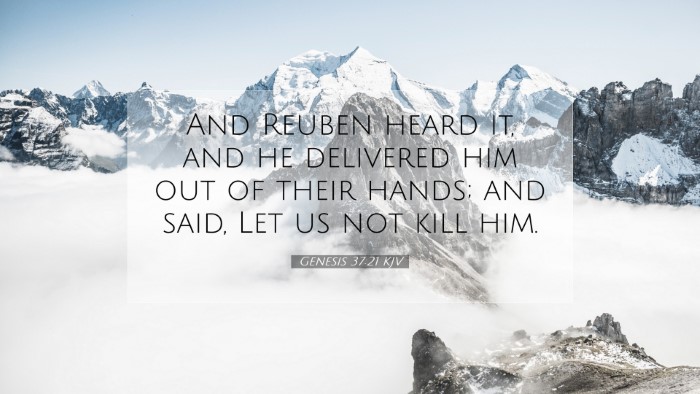Commentary on Genesis 37:21
Genesis 37:21 states, “But when Reuben heard it, he rescued him out of their hands, saying, ‘Let us not take his life.’” This verse captures a crucial moment in the life of Joseph and provides insight into the dynamics of his family. Below is a comprehensive commentary that draws from several public domain sources to elucidate the theological and practical implications of this passage.
Contextual Background
The narrative surrounding Genesis 37 details the early life of Joseph, the favored son of Jacob. This episode of Joseph being sold into slavery sets the stage for the larger story of Israel’s development and the unfolding of God's plan for His people. The dynamics amongst Joseph and his brothers reveal deep-seated issues of jealousy and favoritism, which are pivotal in the narrative.
Analysis of Reuben's Intervention
Reuben's actions are noteworthy, reflecting both familial loyalty and a desire to prevent fratricide. According to Matthew Henry, Reuben “had a mind to save his brother, and he did what he could to divert the wicked intentions of the other brethren.” Reuben's intervention highlights the moral conflict even within a fractured family; he sought to mitigate a crisis stemming from irrational hatred.
Albert Barnes notes that this moment illustrates the moral struggle often faced within families, calling Reuben's actions “a noble intention amidst base plans.” Barnes emphasizes that familial bonds can lead to both protection and conflict, making this incident a reflection of the heart's complexities.
Thematic Considerations
- Family Dynamics: The tension between Joseph and his brothers creates an environment ripe for conflict. Reuben's attempt to defend Joseph can be seen as a momentary stand against the tide of animosity.
- Moral Choice: Reuben faces a critical choice. His desire to rescue Joseph speaks to the broader theme of moral decision-making. The commentary by Adam Clarke emphasizes that even those with less than honorable intentions can sometimes act rightly, illustrating that human nature is complex and often contradictory.
- Dynamics of Jealousy: The jealousy that fuels the brothers’ desire to harm Joseph is a central theme of this narrative. It serves as a precursor to understanding later themes of reconciliation and forgiveness within the broader story of Genesis.
Implications for Learning
This passage offers profound lessons for pastors and theologians regarding the nature of conflict within families and communities. It invites reflection on our responses to jealousy and conflict. Here are some implications:
- Intervention and Advocacy: Just as Reuben intervened to protect Joseph, believers are called to advocate for those in vulnerable positions within their communities.
- The Role of Remorse: Reuben’s later remorse (Genesis 42:22) underscores the need for self-examination and confession in addressing past injustices.
- God’s Sovereignty: The overarching theme in the life of Joseph reminds readers that God can work through human frailty and even conflict to fulfill divine purposes.
Theological Reflections
The theological undertones of this verse encourage readers to reflect on God's providence in human affairs. As outlined by Henry, “the providence of God is the hidden hand that guides the seemingly arbitrary events of life.” In the face of human wickedness, God's purpose often prevails.
This text also directs us toward the concept of grace. The fact that Joseph, through all his suffering, ultimately rises to a position of leadership in Egypt suggests that God can bring good from evil intentions, an essential aspect of Christian doctrine.
Conclusion
Genesis 37:21 encapsulates a moment that is rich in moral and theological implications. As believers, we are reminded to rise above jealousy and familial strife, acting with integrity and compassion towards one another. In the larger scope of God's plan, we can see how this moment resonates through Scripture, ultimately reflecting the redemptive work of Christ.


